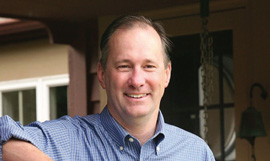Joan and I were out for a drive this past week and went past the house where my family lived until I was 9. There was a chokeberry tree in the fence row which had somehow escaped the developer’s bulldozer when the neighborhood was built. Since it was the only place that offered shade, it became the center of our activity. I was pleased to see it was still standing. It was, at various times in my youth, a jail, a courthouse, a bank, a fort, and the saloon in Gunsmoke. On one Fourth of July the chokeberry tree was Independence Hall in Philadelphia. My brother Glenn was George Washington, and my brother Doug was Benedict Arnold, whom we tied to the chokeberry tree for being a traitor, the treacherous rat. In addition to being a traitor, he was also a communist, even though communism hadn’t yet been invented when George Washington and Benedict Arnold were alive. What our historic knowledge lacked in accuracy, we made up for in zeal.
My brother David and I were given the less glamorous role of writing the Declaration of Independence, a list of grievances we had against the King of England, skillfully portrayed by my sister, whom we also tied to the chokeberry tree, next to Benedict Arnold. Our freedom established, David and I set about writing the Constitution, which I remember as a masterful piece of legislation, though rather simple, with only one guiding law: Those who can, help those who can’t.
Unfortunately, no copies exist of our Constitution. My mother, who it pains me to say had little regard for historic documents, threw it away while cleaning our bedroom. Fortunately, like all great moral codes, it was short enough to remember: Those who can, help those who can’t.
There were, of course, other simple rules that didn’t make it into our Constitution. Be content with what you have. Think ahead. Lead by example. Don’t take any wooden nickels. And the classic, “Do unto others as you would have them do unto you.” But I liked our constitution for its all-encompassing nature–those who can, help those who can’t. If I were starting a new nation, that would be the first and last sentence of our constitution.
Last week, I spoke about imagination, how every human creation began with someone’s imagination, an image constructed in the mind that was not yet real or concrete. I asked the question, “How shall we live together?,” and asked us to imagine what responsible nations might look like, the qualities and characteristics they possess.
Responsible nations elevate this principle in their collective conscience—those who can, help those who can’t. Responsible nations do that because its citizens realize there comes a time in every life, no matter how rich someone is, no matter how bright someone is, no matter how famous someone is, the moment will come to every life when it is the one who can’t.
Not long ago I was visiting a friend in a nursing home, and afterwards it occurred to me how insulated I have been from distress. The color of my skin has insulated me. My gender has insulated me. My wealth has insulated me. My marital status has insulated me. My relative youth has insulated me. My citizenship has insulated me. My social status has insulated me. But visiting the nursing home, it dawned on me the day will arrive in my life when those things will no longer insulate me from difficulty and distress, no longer protect me, and I will be at the mercy of others, just like my friend in the nursing home. I will be one who can’t, depending on the mercy of one who can.
That is true for all of us. There is no escaping it. One day, you and I will be ones who can’t, depending on the mercy of ones who can. That is why responsible nations build into their structures this code of caring. Those who can, help those who can’t. Otherwise, we will live in the kind of nation that Thucydides, the Athenian general and historian, described, “where the strong do what they wish, while the weak suffer what they must.”
We must never become a nation where the strong do what they wish, while the weak suffer what they must.
We must never become a nation where those who can, not only don’t help those who can’t, but compound their misery by heaping burdens upon them they cannot bear.
We must never become a nation whose immigration policies, whose tax structures, whose education programs, whose economic priorities, reveal a cruel determination to thwart the well-being of the powerless and the poor. Responsible nations ensure that those who can, help those who can’t. They know the importance and imperative of mercy. The imperative of mercy. This is what I’m arguing for. Mercy. Those who can, helping those who can’t.
Mercy
by Nikki Giovanni

